Tommy Cash Dropped a New Single, but Who Really Gives a Shit?
Watch the new music video below.
Stay informed on our latest news!
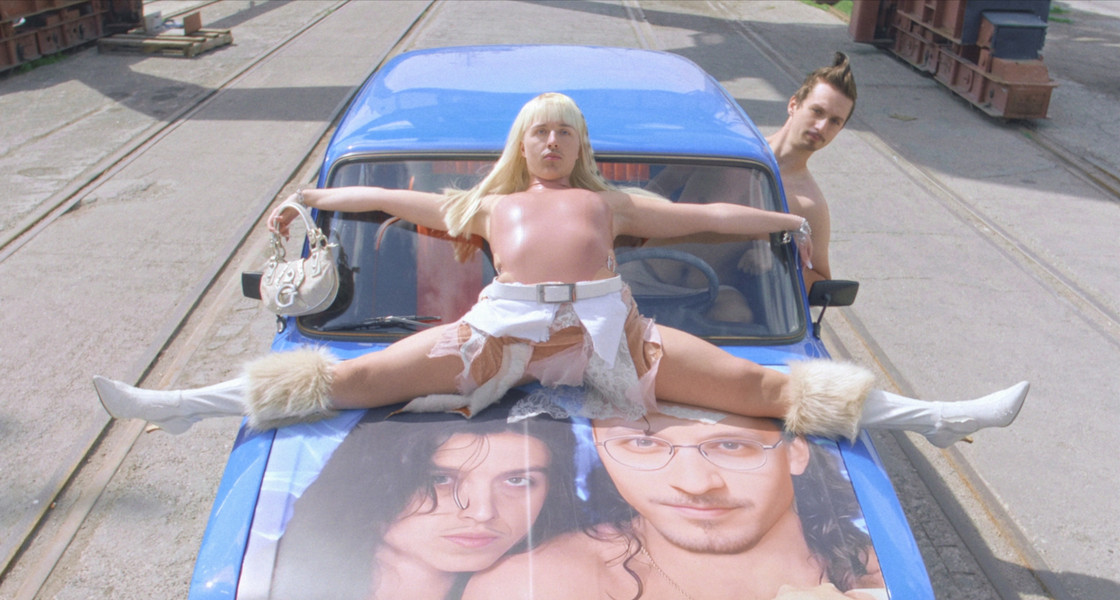
Watch the new music video below.
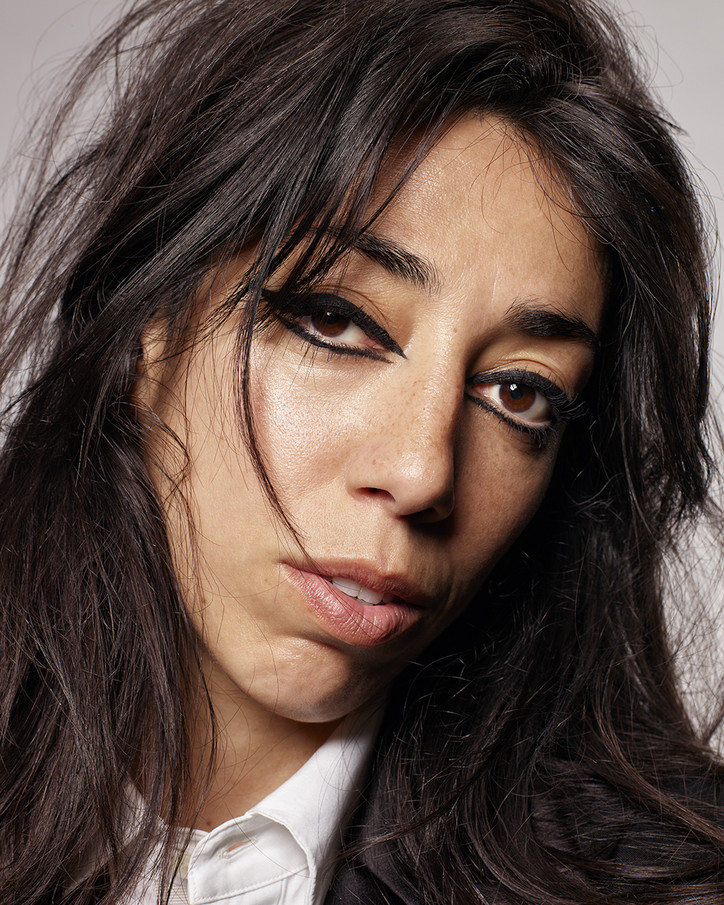
RAHILL wears SACAI blazer and shirt onesie.
Throughout Flowers At Your Feet, field recordings, snippets from home movies, references to film and poetry and allusions to sports legends give us a glimpse at who Rahill really is. From that, to the cover, which is a hazy photograph of her as an infant wearing a gold necklace passed down from her grandmother, it's clear that while she welcomes evolution, she revisits moments in her life like flipping through chapters in a favorite book. "I Smile for E," the lead single and first song on the album features her late aunt singing in Farsi, an acknowledgment of her heritage and a bridge between generations. Ultimately, Rahill calls us to pause, to consider what we spend our time on, and to focus more energy on the people that surround us.
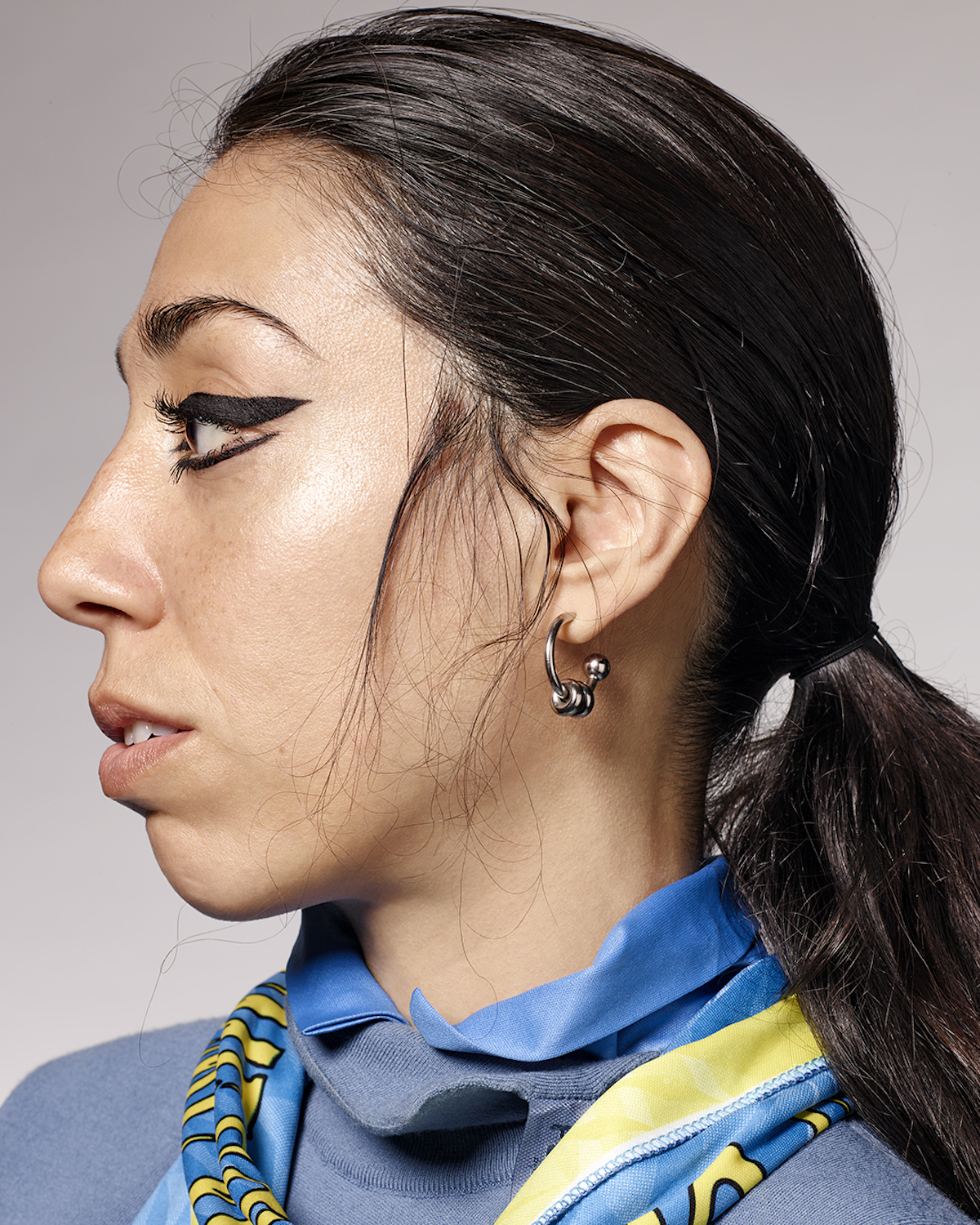
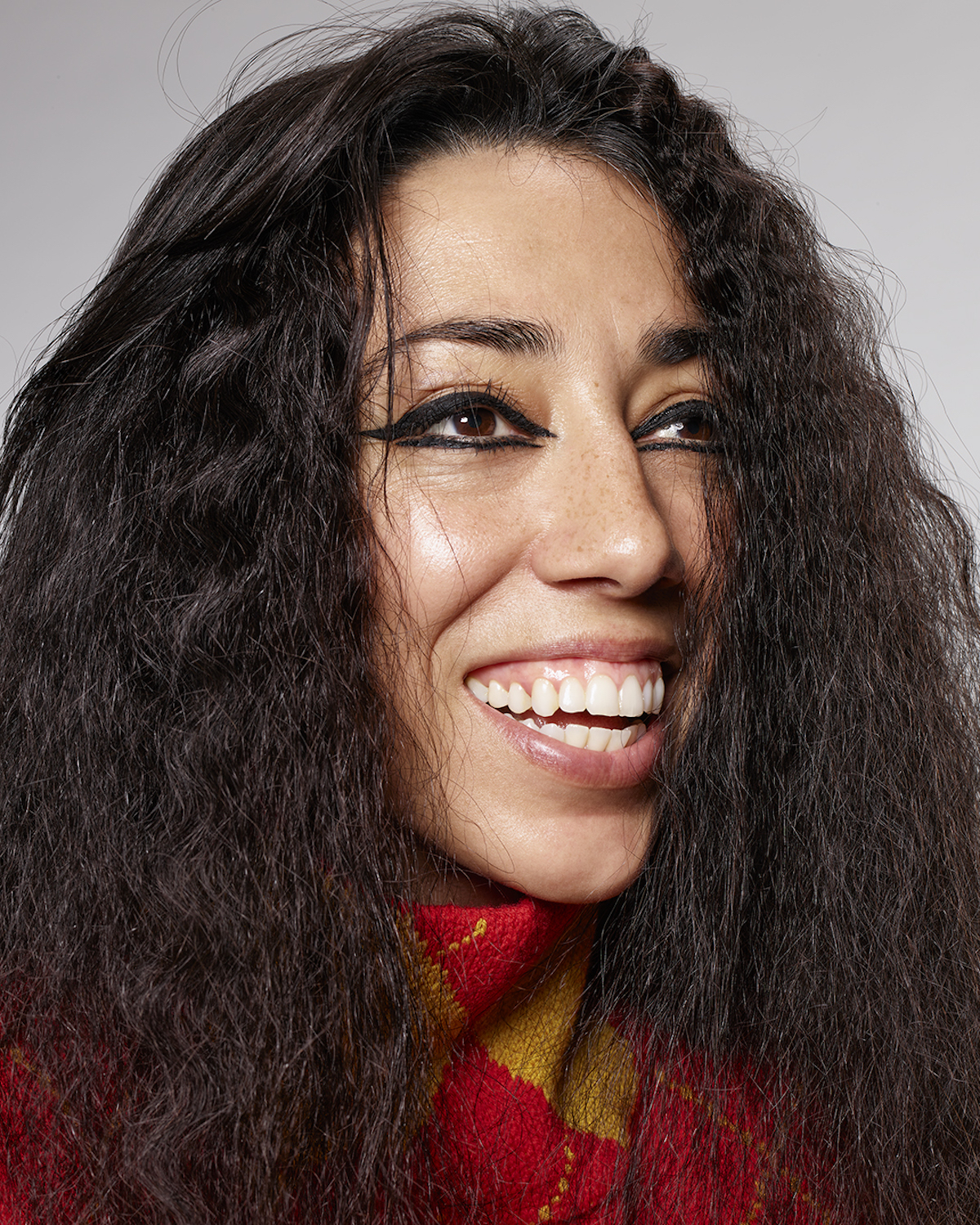
RAHILL wears FENDI sweater, vintage football shirt & scarf, stylist's own.
RAHILL wears LIBERAL YOUTH MINISTRY sweater.
So your album is coming out soon. I’d love to learn more about the journey that led up to Flowers at Your Feet — I hear a story in there of self-acceptance.
Well I’ve always sought different practices to communicate through. Art has always been a practice of communication for me. Being able to tell my story as a child of immigrants. Our generation is really defining that, but it wasn’t always easy to know one’s history with all the diasporas that occurred in the two previous generations. I chose music to connect that together for me and to find that place of being able to understand and appreciate what that means to me.
I’ve been very vocal about being Iranian and celebrating my culture, which is clear in my music – you can tell it has deep roots. I did it when it wasn’t cool. I was the weird kid at school. I was like, 'Fuck ya’ll,' you know? With Flowers at Your Feet, I finally let go of that anchor that holds us back from our truest selves. The album is a testament to that. I don’t give a fuck what’s cool, this just means a lot to me.
Do your childhood and familial experiences influence your musical approach?
Definitely, my dad was really into music and it made a huge impact on me. Music and poetry were always around so I grew to care about the art of storytelling. A lot of indigenous cultures have a kind of storytelling that is lost here in the West. Elders are like fucking encyclopedias, like my grandma. That’s really shaped my way of writing. It’s deeply rooted in our culture, and I think in a lot of indigenous cultures. Visiting Iran, and talking to my dad, I was always interested in old folk songs, but I can’t really seek that out with contemporary music.
Were there any specific musicians or poets your father would read/listen to that still inspire your sound?
There are a few. I love Hafiz and Saadi. They were regarded by western philosophers like Voltaire. Hafiz was the greatest, ancient — in the same realm as Rumi and both him and Saadi are from my dad's city. I used to go to Hafiz’s tomb. It's a beautiful place — so many Sufis visit.
His poetry is very dense — someone has to interpret it for you, but I feel this close connection to it. My grandfather knew all his poems by heart. There’s this contemporary woman I like, she died in the 60s or 70s. Her name was Forough Farrokhzad. She was a pro-woman activist, headstrong, and didn’t care about how she was viewed. Her poetry is beautiful, raw, and almost uncomfortably true.
Do you seek that in your own music? Beauty and truth.
I do believe that it’s shaped my music. I’m very direct with what I think about. I love music that is all over the place and has a mystique to it, but with mine, I make it clear what I’m talking about. I have to be honest and vulnerable. I don’t know any other way to communicate.
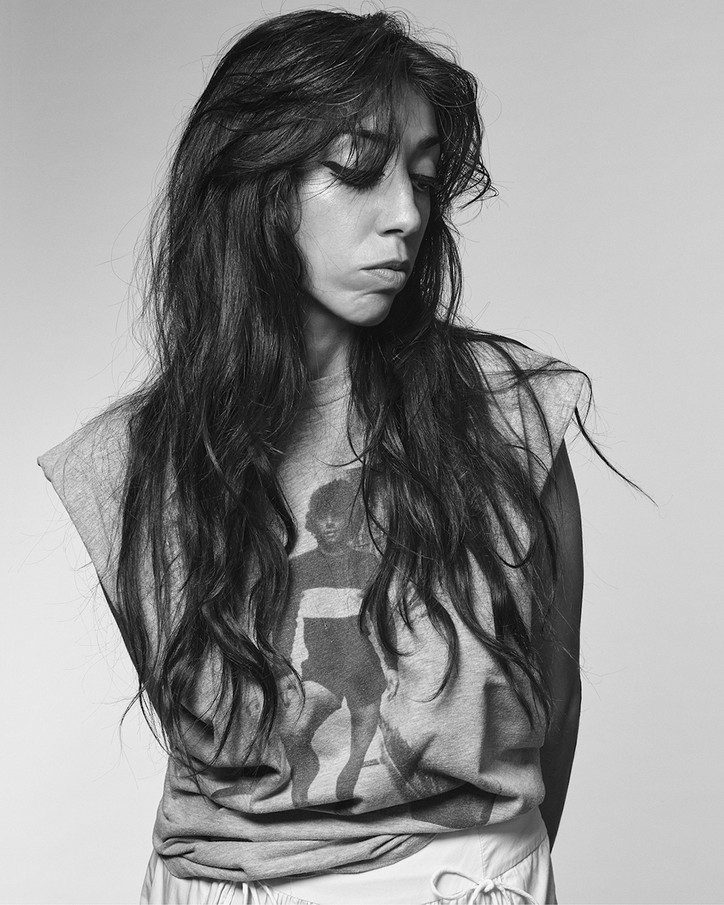
RAHILL wears vintage DIEGO MARADONA t-shirt from CLUB SHOP NY and SANDY LIANG skirt.
How do you balance being a multidisciplinary artist with your role as a musician? Does it come naturally?
Yeah, it totally comes naturally. My art practices inform each other. Sometimes I look forward to the exhaustion of singing. But I also love to focus on drawing a series. Recently I’ve been making visuals for the music on the album and that's been so fun. Oh my god, I have so much respect for videographers and directors now.
For sure. What was it like collaborating with Beck and Jasper Marsalis on the album?
Well, Jasper is a good friend. We actually met in the studio. My producer Alex Epton had worked with him and knew that we would get along so he brought him in. When I met him, I didn't know who he was, but I knew that he was particular. He left an effect, and we got along really well. We just bounced in the studio so I was very grateful that he wanted to work on these songs together. He’s truly such an incredible, and talented musician. I’ll send him a vocal melody and from the tone in my voice he can play guitar and evoke the same emotion I’m trying to convey.
And then I met Beck at a show in LA. And I was like, “What?” It was super surreal. He’s very kind. We were just talking about music and then we exchanged numbers. We stayed in touch, texted back and forth, and eventually, we bonded over cool music stuff. I realized he was a nerd like me so we had a lot to talk about. I started sending him some of the songs on the album and he was really encouraging. It was a huge affirmation because he’s a big inspiration. I didn’t hesitate, I told him that I would love to collaborate on the last track. It was very cool and kind of like Kismet that we met, like once and then we just like, kind of bonded and I went to LA and I met up with him at his studio, and out of it came “Fables”.
Almost like a full-circle moment.
Yeah, yeah, totally.
You worked on this album mostly through lockdown, right?
Yeah, like the second half was written down. Or maybe the majority actually — yeah a good majority of it. It started before lockdown, then we couldn’t do anything for a while, then it was a bit laxer and would test for COVID and head into the studio, then send files back and forth.
How did you refine the album? Did you cut any songs?
Well, it’s funny — the song with Beck, for a while I was just not down for it. It was the last song that we recorded and I was like, “Man, I really feel like I'm trying to make it fit.” It's the fifth song on the album, so it felt so far away from the first few, but Beck actually tied it back into the realm of the album. The song is about family and fleeting emotions. The song after, “hesitations,” gets kinda hot. I knew that the listener would appreciate that one random song. So the album has fourteen songs, which is a lot. My producer and I were ready for the label to say no, but they were like, “Wow, amazing.”
The industry standard is 10 so for them to keep all 14, they must’ve really liked them...
For sure. I was like, “Are you sure?” I think every song blends really well into the next.
You were also part of the Brooklyn garage rock mainstays Habibi. How did that influence your solo work now?
Um, Habibi started when I was really young — over 10 years ago. And it was my first project so it's weird that I only ever did one other thing, although I did have some side projects. It was the beginning stages – we were DIY – so I didn’t really understand the music industry. It’s cool that we accrued a cult following and people really listen to those songs. While that was the start, it’s also super important for me to grow and evolve as a person. When you’re in a band you all bounce ideas off of each other which is great, but sometimes I want to lean into different genres. Habibi is like a sisterhood now, everybody’s really close.
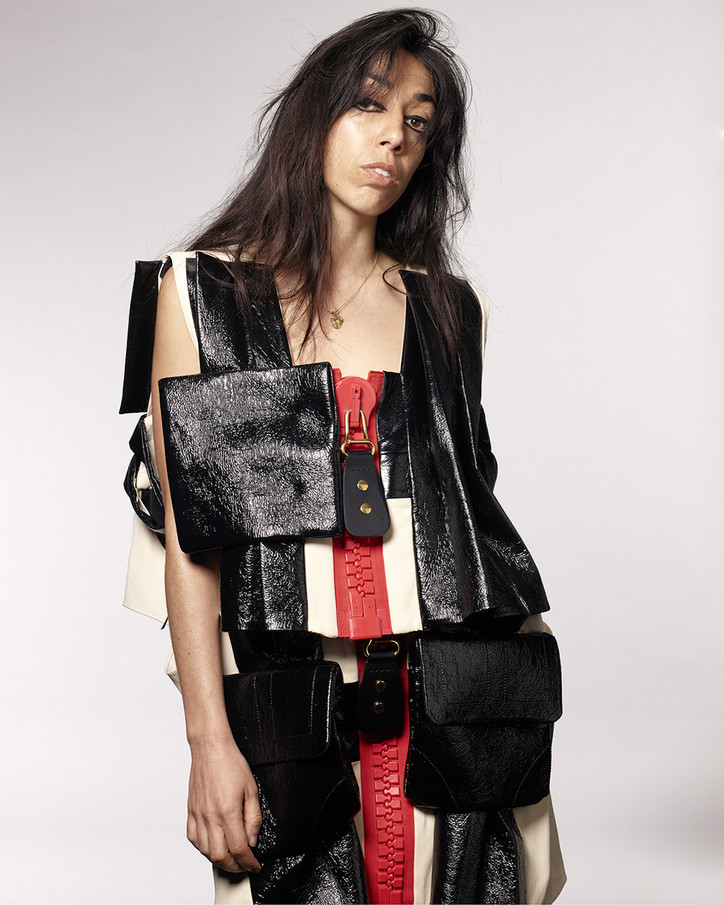
RAHILL wears LOUIS VUITTON, jewelry, talent's own.
Once the album drops, what are you looking forward to? What can we expect from your upcoming performances?
I am always nervous about playing shows. That’s the scariest part for me as a performer. I think some performers are like, “It’s the show, it’s all about the show,” but I like to write and I like to record. However, I'm really excited about what feels like a fresh start. I have an incredible band to play with and I’m really looking forward to seeing how the audience interacts.
What do you hope is your audience's biggest takeaway?
The nicest thing I’ve heard — from friends and others I’ve shared the record with — is that the album made them think of someone they’re close with. My hope is always to connect people back to others and themselves.
It’s crazy that you say that because when I listened to it for the first time, the tracks immediately made me reflect on myself.
I love that. That’s really what I aimed to do. It’s wild to be really vulnerable, but that headspace also centers you. You may get caught up, but you have yourself there to act as a guide through the madness. It’s about that personal connection, and the music facilitates that.
Totally. I can see that. It’s funny reading the title now with this context. Flowers at Your Feet. You’re telling the listener to look down and chill out for a second.
There are so many levels to that title. It’s exactly what you’re saying – me giving this to you, you giving it to somebody else. Flowers are also such a ceremonial thing for us in life. When you arrive at an airport you’re handed flowers. When you go to a grave site you leave flowers. At competitions, graduations, etc. there are flowers. It’s such a symbol of love and adoration. The title acts as the gate of the album that leads into a place of honor — all you have to do is leave all that other stuff at the door.
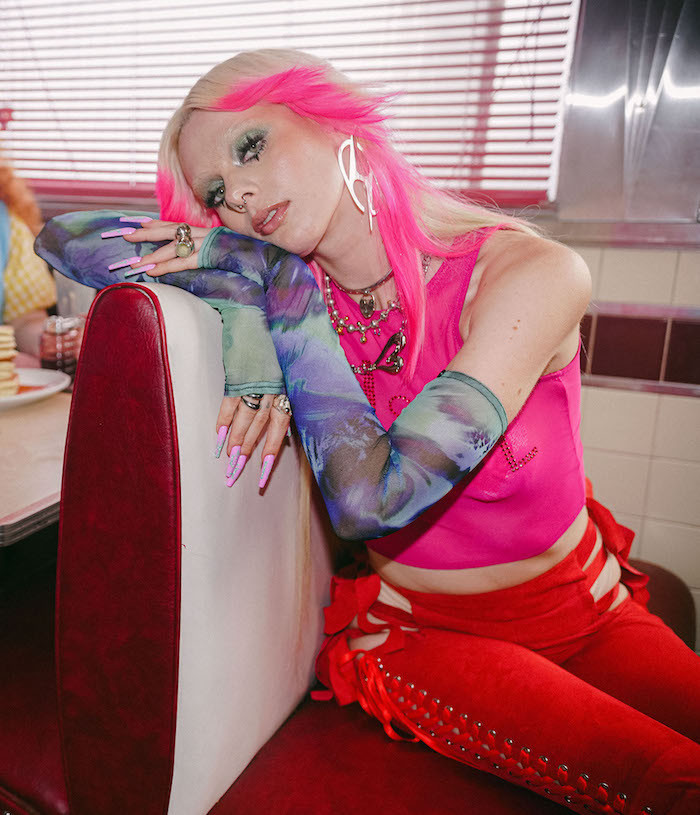
office caught up with the UK-bred musician in between tour dates to discuss her new EP, why am i like this??, and how she champions the woman experience every step of the way.
Growing up, you first took on acting before music. What eventually led you to pivot to music and, looking back, do you feel you made the right decision?
My parents are both actors and I was so lucky to be able to spend a lot of time going to plays and in the theater when I was a kid. I think that's where my love of performing came from. So initially I wanted to be an actor and do what my parents do. But I later realized I didn't really want to play other people. I wanted to tell my own stories. I started writing and I loved writing short stories, poetry, and fiction. And then that just kind of turned into songs because my love of music really kicked off when I was a teenager. I'm definitely happy I did that. I would still love to act, but I definitely think I'm more comfortable performing and singing.
I mean, it's a totally different ballgame. I saw that you have also started a video series called 'I'm Obsessed With,' where you speak to other people about their favorite parts of their respective cities or hometowns. What is your favorite part about where you are from and how did it shape you as a person?
I grew up in London and I think growing up in a big city that has so much going on creatively and just so much life in it definitely influenced my music. When I started making music I was very inspired by the London music scene, especially because a lot of my lyrics are very observational. A lot of my early songs were about London, people I observed, conversations I overheard, and my experience figuring my life out and exploring this place. I think now I'm actually in a position where my music is less and less about the city I'm in and more about just my experiences, wherever that may be. So I feel like the influence of London has maybe decreased, but it's still my home.
Many of your songs provide insight as you grapple with your identity and outward persona. One of the topics you discuss lyrically is your sexuality and feeling the liberty to express yourself truly. How has music helped you come out of your shell and express these notions more precisely?
I think that writing songs is one of the only ways I know how to express those things. I think that's the reason why I was so drawn to it as an art form because I was like, 'Oh my God, this is like my therapy or my outlet.' That's definitely because music and bands got me through my adolescence and have continued to get me through a lot of tough situations in my life. Listening to other people's songs made me realize, well, maybe writing them can help me too.
Your music champions a fierce sense of femininity, and your stage name reflects that message. What does your stage name signify to you?
I think I wanted to reclaim a word that described an aspect of femininity but in a negative way. The idea of something being girly implies that it's weak. Well, that's how it felt, you know, when I was growing up. It was silly and it was a bit pathetic — submissive and weak. I wanted to kind of repurpose that word and be like, 'Actually, I am girly and that is powerful.' I wanted a name that represented a strong sort of feminine persona.
It's a really cool notion to put forth because there are so many people out there who struggle with identity and don't want to be perceived as a 'girly girl' because of what that “means” about you as a person and your strength. Songs like “Hot Mess” and “I Don’t Like Myself” reveal that pesky inner monologue that we have all experienced in everyday life. Your music takes on a very self-aware quality as you pour your emotions into every song, but they’re also very relatable as we’ve all felt these feelings. How does this process help you sort through your emotions and preserve your mental health?
Songwriting, for me, has the same benefits that journaling has. I journal as well, but songwriting is like another version of journaling and there are plenty of studies to show that journaling really helps with mental health because it's a way of processing things. That's what songwriting is for me. It's processing something that's happened to me; it's an outlet and an escape. I feel so lucky and grateful to have that not only as something that I have time to do but also as something that's my job. I get to write songs and perform them for people — full-time. That's amazing to me.
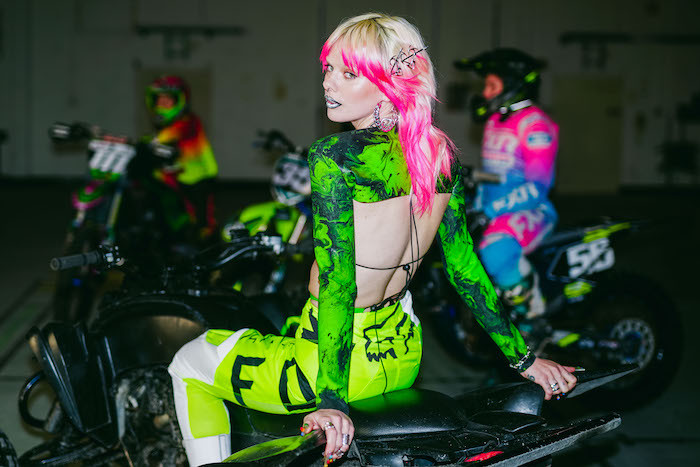
And in the same way that you get that release through the music, there are people who can listen to it who are thinking, 'This is exactly what I needed to hear.' That relatability is something that I really enjoy about your music, especially the lyrics. You bring this really infectious pop energy. But I know you also used to perform in an indie rock band and you have interests in drum and bass and beat making. If I had to guess what your music library looks like, I would guess it's probably pretty diverse. Who or what inspires your sound?
Nowadays, the music that inspires me is just constantly changing. But growing up, my dad listened to a lot of current music at the time, which meant that even though I was like 10 when all of these albums came out, I still got to hear them. So Arctic Monkeys — their first albums, Amy Winehouse, M.I.A., Lilly Allen, Scissor Sisters. All of these artists, my dad had the CDs and he was playing them in the car. He was just a middle-aged dad, but he was so into everything that was coming out of the UK music scene at that time. That was an incredible time for a lot of artists. And many of the artists that came out at that time were very opinionated. Their lyrics were really real and cheeky. And I think, lyrically, I was very inspired by those artists. Then musically, it's always changing and I think, for me, that's really exciting because I know I make music, but first and foremost I see myself as a storyteller. So it's exciting for me that I don't feel like I need to box myself in. I'm just constantly experimenting and every time I'm working on a different project, I'm listening to different things. But I'm definitely trying to make pop that just sounds completely different from any kind of pop you've heard before. And that's a lifelong quest.
The cool thing about your music is that there's a throughline with the lyrics, but the sound is multifaceted. I also want to touch on your latest EP — tell me the story behind your favorite track on the EP and how it came to be.
I think my favorite track always changes from the EP. I'd say probably "I Really Fucked It Up" or "In a Child" are my favorites. But then also "Imposter Syndrome." I mean I love all of them. But "I Really Fucked It Up" was the first song that I wrote from this EP that felt like I could build a project around it. It was also related to why I ended up choosing to call the EP why am i like this?? because that song is all about watching yourself cause destruction to people you love and within your life and just feeling like, 'I don't even know how to change this. I don't know why I do these things.' So the whole EP is about taking a real hard look at myself in the mirror and being like, 'What are the patterns and habits that I need to sort out?' And not in a negative way necessarily — in a healing, self-love way.
What did you feel like you learned about yourself in that process? It seems like it was a very introspective process.
I think the biggest realization for me was that I am a work in progress and I don't have to have everything figured out right now. I constantly felt this pressure that I needed to have everything figured out and that everyone else knew what they were doing. I felt like I didn't get the guidebook to life like everyone else did. So writing these songs definitely helped me get more comfortable with the idea that I don't know what I'm doing and I don't know who I am and that question, 'Why am I like this?' Well, I probably will never fully understand the answer to that. And then also it's about how I am learning to accept that and love that. It's about owning that you are chaotic but in a beautiful way.
I mean I think we all are, and I think what you said goes for everyone. Your style reflects the vivid, energetic qualities of your music, and it's hard to miss your vibrant pink hair when you’re performing on stage. If you had to describe your personal style in three words, what would they be? What informs your style?
Three words to describe my style would probably be: energetic, colorful, and experimental. Growing up, I really loved the Spice Girls. When I started getting into fashion, I was really into the 90s style, but then I was also really inspired by Japanese fashion. I remember finding so many amazing Japanese street-style magazines and being so inspired by how colorful and experimental that style is. Which are two of the words I just used to describe myself! And then I think I definitely would say that my queerness and my involvement in the community and meeting more LGBTQ+ artists, that has also influenced my style because LGBTQ+ people just dominate the fashion industry. They're really influencing big fashion trends. But I think also going to events and seeing other queer women and what they were wearing definitely inspired my fashion as well.
Empowering women with your platform is something very near and dear to your heart. In what ways does your music challenge societal stereotypes regarding women and allow us to rewrite our own narrative?
I've always felt that music and my songs were kind of a weapon to challenge the stereotypes and ideas that come along with being a woman. I call myself Girli, but a lot of my early songs were rebellious and had some bite to them — some of my songs still do — but especially the first music that I released was very loud and in your face and definitely not what you would expect from an artist called Girli. It was just the opposite of what you’d expect. It was really stompy and angry and in your face. My music tells the stories of things that I've experienced and I have songs about misogyny I've experienced, songs about catcalling — my song “Not That Girl,” it's about being catcalled. My song “Hot Mess” is about experiencing sexism within the music industry. I think it's always felt very powerful to release that music and have people find those songs and feel empowered by them. And also playing them live feels so amazing because everyone's screaming it together and music can be protest.
I really like the idea of music as a weapon. I think that's extremely powerful. I know you played some headline shows in March and then you just announced more tour dates across the U.S. What is your favorite part about touring and what are you looking forward to for the new dates this time around?
The U.S. tour that I just did in March was amazing because I've never played shows in the U.S. before. I have interactions every day with fans online, but actually being able to physically perform and talk to people is so important. I always go to the merch stand and speak to fans for sometimes up to two hours after the show. Sometimes the speaking and hanging out afterward is longer than the actual show because I just love meeting them and hearing their stories. I just think that's so amazing and it's human. Social media can make a lot of people, especially myself, feel so disillusioned and isolated from what actually matters. In what I do, real lives are being impacted in a positive way. And that's definitely my favorite part. When I'm in there and I'm singing to a whole room of people, it theoretically could be any kind of time zone — even a hundred years ago. Obviously, it's not because a hundred years ago I probably would be sent to prison for singing about being gay and having armpit hair. But it's still this amazing feeling of phones, the internet, and social media becoming irrelevant and I love that.
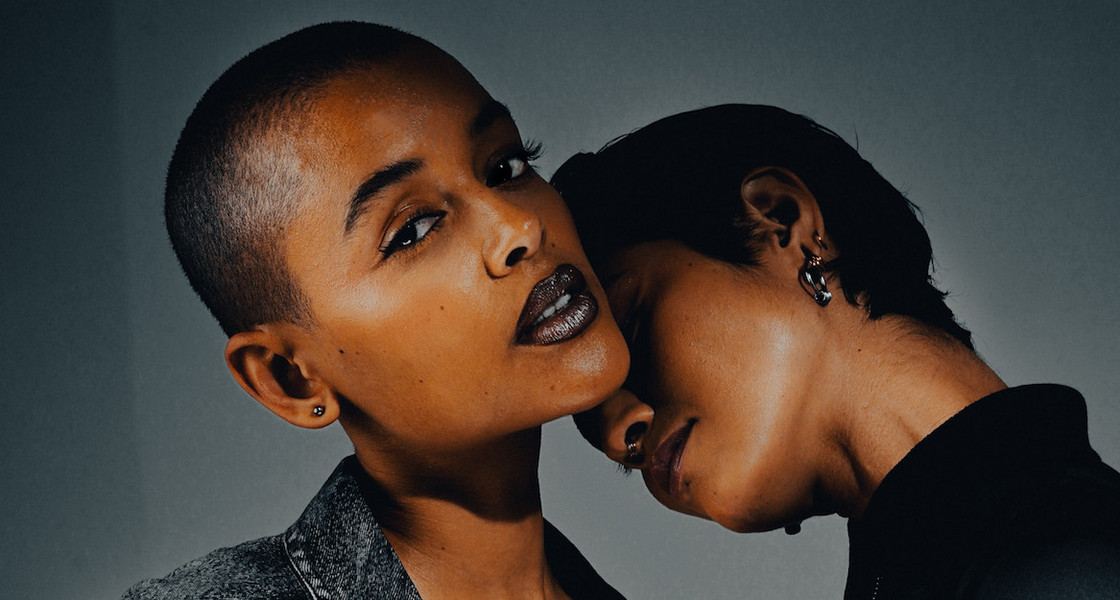
The music video for MND3GMA's new single, Tayong Dalawa, is out now on streaming platforms.
Ahead of the release, office sat down with the pair to dive into their creative process, from the birth of the band to their first music video.
Sophia Lucina—Thanks so much for meeting with me. Before we start, I recognized your name, MND3GMA, or mandirigma, is Tagalog?
Sakina Garcia— Yes, it’s Tagalog for “warrior”!
Jordan Alexander— Stop, I’m so glad you noticed that. That’s so cool.
I’m Filipino too, and I recognized it right away.
SG—Tagalog is my first language, so I proposed the name to Jordy as a way to stay connected to that culture.
JA— I never had a specific culture that I felt connected with, so it was such a great opportunity to learn about Sakina’s. What I like most about mandirigma is that, yes, it means warrior as in “fight,” “kill,” but it’s also about honor, pride, and your ability to be your authentic self. The fight for life. And I think that’s what the band encompasses as well.
Totally. That’s so badass. Jordan, I was first introduced to you in a TV setting, with your role on the Gossip Girl reboot. How was the transition from acting to music?
JA— It’s interesting, because music actually predates acting for me. I’ve been doing it on my own for quite a while, so it’s more so that I took a break from music to try acting.
I see. I bet you were busy, did you get to balance those two interests?
JA— Any time I had free time, I’d just be writing. And when I went home for lockdown in 2021, Sakina and I just started making music… and we never stopped.
SG— It all started falling together. Snowballing into this great idea that we could actually start a band.
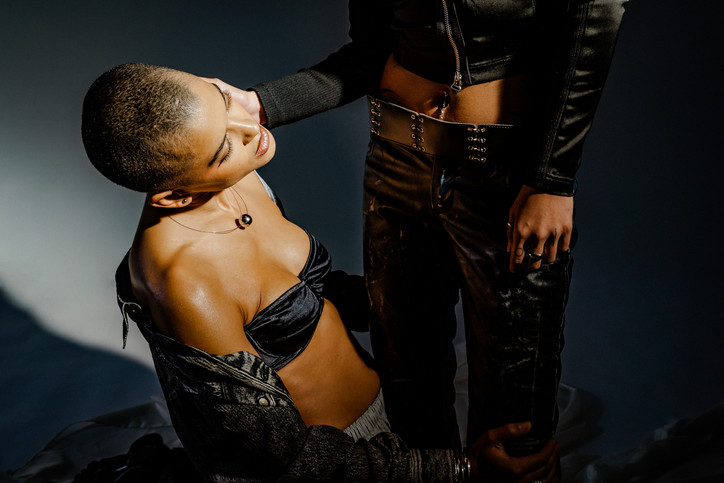
So was a project like this always in the cards for you both?
JA— I never imagined I’d be doing something like this.
SG— [laughs] I’ve always wanted to do something like this.
I’ve always loved when a project seems to come out of nowhere. But then it all just falls into place. Especially when you find the perfect dynamic with someone else.
JA— Exactly, I love working with Sakina. I’ve been on this journey of how to open up more with songwriting, and with English being their second language, the way they put lyrics together are in ways I could never have thought of.
SG— And sometimes I’ll be anxious to write something in English, but Jordy will be there to encourage me. She’ll be like, 'say it the way your brain wants to, and we’ll work from there.'
Such a perfect push and pull. I love that.
SG— So when we mesh, we’re so sick. It’s this sick energy.
JA— And they’re a DJ, so they have such a wide knowledge of music. And I’m more used to pop music. It’s like we have our strengths and challenges in opposite ways, so it balances out.
And it all meshes so perfectly in your new single. I want to hear about that process!
JA— When we first started the process of writing Tayong Dalawa, I was picking up on Sakina’s vibe of staying connected to their roots. This, combined with a different comfort level with English, is where we got the idea to write the song in Tagalog.
SG— She would come up with the melodies, and I would fill in the words.
Jordan, how was it singing in a different language?
JA— Interesting. Fascinating. And even though I’ve seen the English version now, for the most part during recording, I was just singing phonetically.
SG— But even without knowing the words, the track produces this feeling. It’s a track that you can dedicate to someone. To anyone.
I was just about to ask, what kind of emotions does Tayong Dalawa bring up? What kind of setting do you see it playing in?
JA— DARTY. BEACH DARTY. Or a rooftop in New York. We just want people to dance to this.
SG— Right, just anywhere outside! Backyards. Street dances. You know, how like in the Philippines, they’ll just throw a kickback anywhere. It’s about enjoying wherever you might be.
Totally a kickback song. I can see this bringing crowds of just about anyone together.
SG— It’s such a song for the masses, it’s this communal feeling.
JA— Everyone has these special connections that can’t be put into words. A person that you just vibe with. Someone you adore. Your mom, your coworker, a friend, that unexplainable spark.
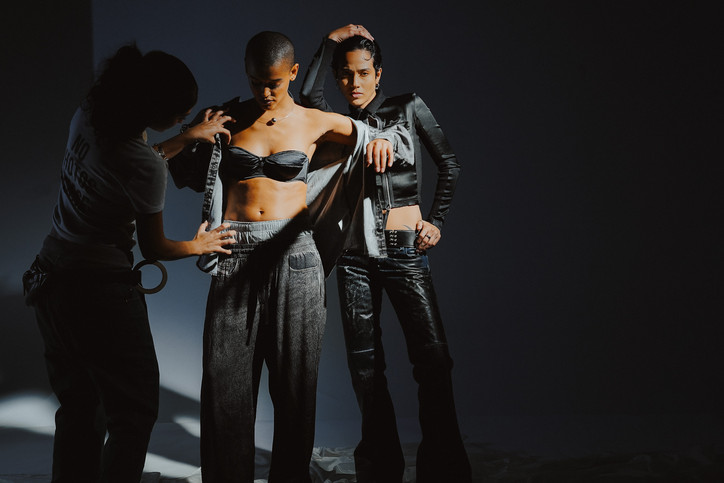
And not only are you blessing us with a single, but a music video only a few days after.
SG— Yes, so we filmed the music video in the Philippines, with an all Filipino crew!
Reppin’! And what was it like shooting in Sakina’s home base?
SG— It was warm, and nothing matters when it’s warm. [laughs] We were just running around and enjoying the space. I hadn’t been home in so long, in five years. There were so many locations I had totally forgotten about.
JA— Elena Virata directed it, and she’s just an incredible director and filmmaker. It was thrilling, definitely. We had a small but mighty team, and we would be run-and-go for long shoot days. On our last day, we were up at 4am with the crew just to make sure we could wrap.
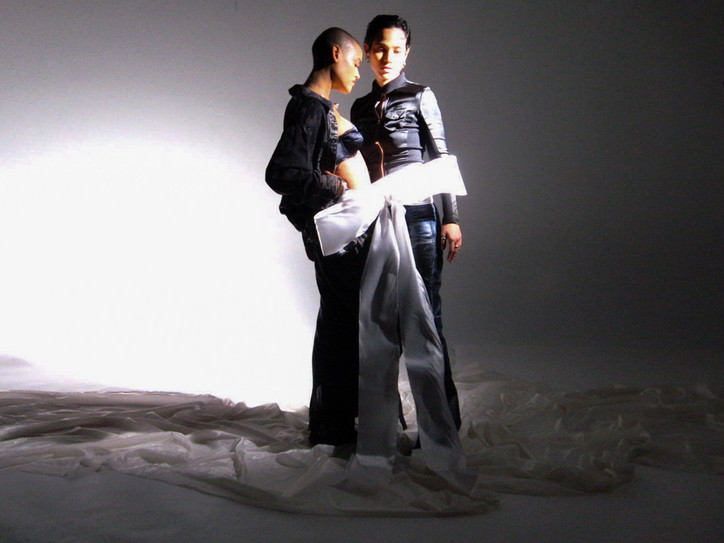
Respect. And those makeup looks probably took forever. They’re so intricate.
SG— That’s all our amazing makeup artist Drian Battista. She’s a genius. We found her looks from her instagram — she’s able to do these eccentric, otherworldly looks.
JA— And so I messaged her, like, “hey, we’re coming to the Philippines!” and she was immediately so down.
I was just looking at her posts. She makes herself unrecognizable, in the dopest way. And she did the same, turning you both into these alien creatures.
JA— Yeah, when Sakina and I were writing the treatment for the video, and we really liked this concept of this juxtaposition between two creatures — my makeup is red and yellow, and Saki’s is blue and yellow.
SG— Which, by the way, is inspired by the Philippines flag. The whole video is about these two aliens who get dropped on the earth, and have to reconnect. Tayong Dalawa, “The two of us”, trying to find our way back to each other.
It’s extraterrestrial, but in a way, it’s very human. I sensed that from the video right away.
SG— Right, it’s about the fear of the unknown that comes with unconditional love.
JA— How you don’t have to surround yourself with people who are like you. Having a diversity of people around you and in your experiences is how we can better share love. And bring others together. That’s really what MND3GMA’s all about.
I can’t wait to see more from you guys. It was so sick getting to chat with you both about your process. And with a fellow Filipino too!
SG— [laughs] Thank you!
JA— Yes, thank you!